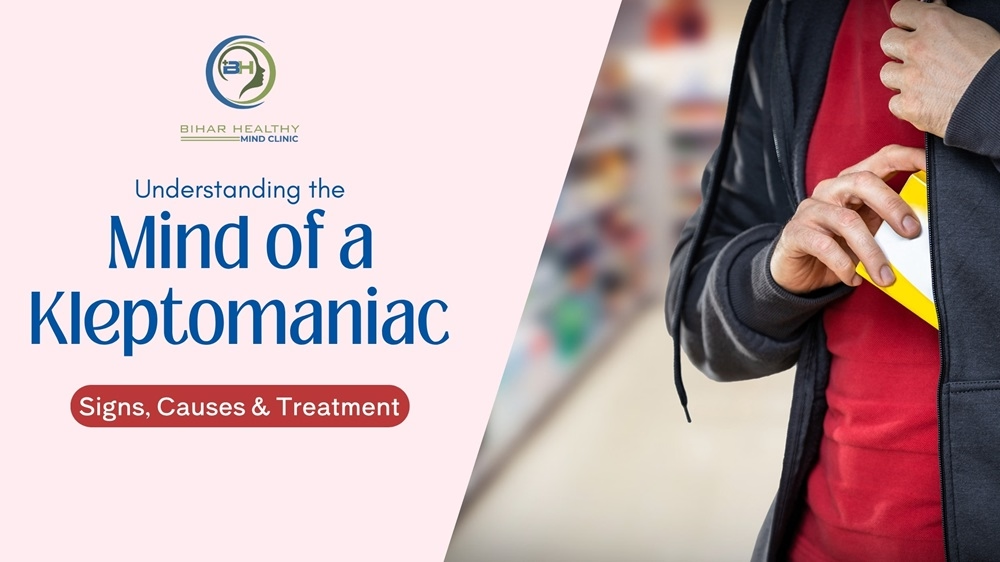
Kleptomania is often misunderstood as mere stealing, but it is, in fact, a serious mental health disorder. Individuals affected by this condition, commonly referred to as kleptomaniacs, struggle with an uncontrollable urge to steal items they often don’t need or could afford to buy. This compulsive behavior is not driven by necessity, but rather by psychological triggers that need professional attention.
At Patna Psychiatry, Dr. Saurabh Kumar, MD (Psychiatry), provides exceptional care and evidence-based treatment approaches for such impulse control disorders. In this blog, we explore the core aspects of kleptomania, including its signs, causes, and the most effective treatment strategies, especially for those looking for help from the Best Psychologist in Patna.
What is Kleptomania?
Kleptomania is a rare but complex psychiatric disorder classified under Impulse Control Disorders (ICDs). A kleptomaniac does not steal out of greed, rebellion, or financial hardship. Rather than personal gain, the act of stealing often brings a fleeting sense of relief or satisfaction, soon overshadowed by feelings of remorse or embarrassment.
This condition can severely impact an individual’s social life, career, and mental well-being. Yet, many suffer in silence due to the stigma associated with the behavior. Early diagnosis and appropriate treatment are crucial to manage and overcome kleptomania.
Common Signs of a Kleptomaniac
Understanding the behavioral patterns of a kleptomaniac can help in early detection and intervention. Here are the most frequently observed signs:
- Repeated Theft of Unnecessary Items: The person steals objects that are not needed or hold little value.
- Rising Tension Before Stealing: A build-up of anxiety or emotional discomfort before committing the act.
- Relief or Pleasure After Stealing: A temporary emotional release or gratification post-theft.
- Guilt or Regret: Feelings of shame, self-blame, or remorse after the incident.
- Not Done for Personal Gain: Unlike criminals, kleptomaniacs don't steal for monetary benefit or revenge.
If you or someone you know displays these signs consistently, it may be time to seek support from a mental health professional like the Best Psychologist in Patna.
Causes and Risk Factors
While the exact cause of kleptomania remains uncertain, research indicates that several biological and psychological factors may contribute:
- Neurochemical Imbalance- Serotonin, a neurotransmitter that regulates mood and impulse control, is often found to be imbalanced in kleptomaniacs. An imbalance can disrupt emotional control, leading to impulsive actions and difficulty managing responses.
- Dopamine Dysregulation- Stealing can trigger the release of dopamine, the "feel-good" chemical, which reinforces the act as pleasurable, despite being harmful.
- Psychological Triggers- Emotional traumas, such as abuse, neglect, or severe stress, can act as catalysts. Some individuals turn to stealing as a way of coping with unresolved emotional pain.
- Co-occurring Mental Health Disorders- Kleptomania often coexists with other psychiatric issues like depression, anxiety, obsessive-compulsive disorder (OCD), or eating disorders.
- Genetic Predisposition- People with a family background of impulse-related conditions may have a higher likelihood of developing similar behavioral issues.
At Patna Psychiatry, Dr. Saurabh Kumar carefully assesses these contributing factors to provide a personalized and science-backed treatment plan.
Treatment Options for Kleptomania
Treatment for a kleptomaniac involves a combination of therapy, medication, and lifestyle modification. The goal is to address the root cause and equip the individual with tools to manage the urge to steal.
Cognitive Behavioral Therapy (CBT)
CBT is the most effective psychological intervention for kleptomania. It enables individuals to recognize negative thinking habits and adopt more constructive, positive responses. Exposure therapy and impulse control training are commonly used techniques within CBT.
Medication
Selective Serotonin Reuptake Inhibitors (SSRIs), mood stabilizers, and anti-addiction medications are sometimes prescribed to correct chemical imbalances and reduce compulsive urges.
Group and Family Therapy
Group therapy can reduce feelings of isolation, while family counseling educates loved ones and helps build a supportive environment.
Relapse Prevention Planning
Patients are taught coping strategies to prevent future incidents and manage high-risk situations effectively.
If you're in Bihar or nearby regions, consulting the Best Psychologist in Patna at Patna Psychiatry ensures access to holistic treatment approaches tailored to your needs.
When to Seek Help
Many kleptomaniacs delay seeking help out of fear of judgment or legal consequences. However, untreated kleptomania can lead to repeated arrests, strained relationships, and emotional distress. If you suspect that you or someone close may be struggling with kleptomania, early professional intervention is key.
At Patna Psychiatry, Dr. Saurabh Kumar offers a confidential, non-judgmental space where patients can receive compassionate care and effective treatment. His expertise in handling complex psychiatric disorders has made him one of the most trusted names in mental health care.
Conclusion
Kleptomania goes beyond mere theft, it's a psychological condition that demands compassion, awareness, and professional treatment. Identifying the signs early and consulting a qualified mental health professional can lead to successful recovery. Whether you are seeking support for yourself or a loved one, reaching out to the Best Psychologist in Patna at Patna Psychiatry could be the first step toward healing.
Don’t allow guilt or fear to prevent you from seeking support, mental well-being is important and professional help is within reach.
Disclaimer: All characters and events depicted in this blog are entirely fictional. Any resemblance to actual persons, living or dead, is purely coincidental. The content is intended for informational purposes only and should not be considered as medical advice. Always consult a qualified healthcare professional for medical concerns.
Visitors: 292





No comments yet.